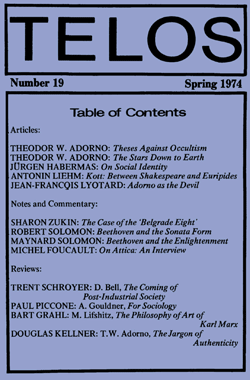As an occasional feature on TELOSscope, we highlight a past Telos article whose critical insights continue to illuminate our thinking and challenge our assumptions. Today, Yonathan Listik looks at Jürgen Habermas’s “On Social Identity,” from Telos 19 (Spring 1974).
 Jürgen Habermas’s objective in “On Social Identity” is clearly defending the usage of instrumental rationality toward the development of a universal morality. For Habermas, the new social identity should be constructed through universalistic moral systems, thereby eliminating possible frictions or incoherence present in modern society. The obsolescence of the state and its replacement by autonomous means of identity construction, such as art, already point to his emphasis on a more particular form of identity construction.
Jürgen Habermas’s objective in “On Social Identity” is clearly defending the usage of instrumental rationality toward the development of a universal morality. For Habermas, the new social identity should be constructed through universalistic moral systems, thereby eliminating possible frictions or incoherence present in modern society. The obsolescence of the state and its replacement by autonomous means of identity construction, such as art, already point to his emphasis on a more particular form of identity construction.
Nevertheless Habermas’s theory essentially depends on the assumption that such a universalistic morality is indeed a universal interest. This is obviously questionable; but even if not true, Habermas’s hypothesis still provides an interesting question. The first aspect to point out is that universalistic is not synonymous to universal. By universalistic the intention is that the concern is to be directed toward exterior elements. In other words, universalistic here is the opposite of ethnocentric and not the demand for a universal unanimity. Habermas accepts differences of identities if these do not cause hostility between parties: “Its form would be an identity, non-prejudiced in its content and independent of particular organizational types, of the community of those who engage in discursive and experimental formation of an identity-related knowledge on the basis of critical appropriation of tradition as well as the impetus from science, philosophy and arts.”
Morality should come from rational thought that takes into consideration these demands. This is what Habermas refers to as future planning. Every new identity is obviously directed into a future perspective of a possible structure. Still it is not completely suspended from reality. For Habermas, tradition plays a central role in the development of a new identity structure. He argues that every new structure is already directed toward the future. The consideration of tradition in this context would not be reactionary but rather revolutionary within the context of the universalistic system. As mentioned earlier, Habermas is not interest in a universal identity, and tradition comes to reinforce that.
This idea seems to work ideally. Habermas is asking humanity to abandon the influence of capital and state and to rethink their identities within their local groups into a new identity that takes into consideration other cultures and attempts to live peacefully among them. This is certainly ideal since it manages to both preserve local groups, which could in fact be threatened under state capitalism, and a universal perspective so as to create a more harmonic society. Without a doubt in a society where everyone’s identity is not formed by the boundaries of a specific territory or organization, ethnic or national conflicts would be meaningless. If traditions are placed under a critical filter of rationality they cannot be harmful to the universalistic moral system.
Still, there is a feeling that this is, to a certain extent, utopian. Both the assumption that this is of common interest and that it will inevitably solve the issues, is not as secure as presented: “The new identity of an as yet emergent global society cannot find articulation in world images, although it must, of course, presuppose the validity of universalistic moral systems.” This is to some extent an ethnocentric assumption that western rationality is basically the universal way. Even if it considered as being instrumental and not objective, rationality is still to some extent a western mode and not automatically applicable to any social group. The capacity for universalistic thought taken by him as a universal trait might be relevant just in the context of a Western moral system. (It is important to point out here that in no way does this mean that western civilization is more developed. This capacity is not to be taken as a superior trait but simply as a different trait developed by one group and not the other.)
Nevertheless, as mentioned before, there is no reason to completely disregard Habermas’s theory. A universalistic moral system to some degree provides answers to both absolute relativism and cultural imposition. These two extremes generate similar problems, such as ethnic conflicts and immoral customs (e.g., female genital mutilation). As open-minded and respectful as a person might be, there are things that are intuitively immoral regardless of their deep cultural roots. It is very hard to imagine that someone would defend apartheid as a cultural demonstration that should be preserved, or argue that any violation of it can be characterized as an external infringement on South African identity.
A universalistic moral system provides a possible solution to the issue because it is not imposing. The single demand is that you think rationally about other cultures and take them into consideration when relating to your particular tradition. This way it is possible to judge these immoral traditions because there is no return to the western model of development. There is no imposition of a solution but just a refraining from abuses. In fact, the western model has also to check itself about possible similar issues.
Read the full version of Jürgen Habermas’s “On Social Identity” at the Telos Online website. If you are affiliated with an institution that is an online subscriber to Telos, you have free access to our complete online archive. If not, you can purchase 24-hour access to this and other Telos articles at a per-article rate. Follow the article link for more details.



